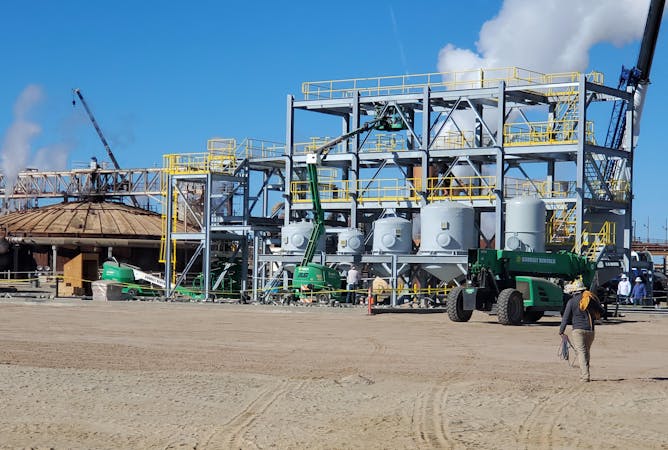|
|
|
|
President Biden on Monday warned businesses to bolster their defenses in case of a cyberattack from Russia aimed at critical infrastructure. There’s another vulnerability to our electrical and digital systems that people rarely hear about: the danger from a geomagnetic storm. David Wallace, an electrical engineer specialized in the power grid from Mississippi State University, encapsulates the many ways a burst of solar energy that reaches our atmosphere could disrupt daily life. The planet has experienced these events in the past and, as Wallace says, it is only a matter of time before another geomagnetic storm hits.
A very active area of medical research is in the treatment of PTSD and other mental illnesses using psychotropic drugs such as psilocybin that influence a person’s mental state. To better understand how psychedelic chemicals influence the brain, a research team used machine learning to map the words people used to describe their hallucinogenic experiences with specific receptors in the brain. Their findings confirm what the current literature shows about how these
drugs affect different parts of the brain, which the researchers hope will yield insights into how these compounds can be used effectively.
The market for geothermal energy in the U.S. is “stagnant,” but incorporating lithium extraction into the process could help expand it, write Bryant Jones from Boise State University and Michael McKibben of the University of California, Riverside. Lithium is a critical mineral for batteries used in electric vehicles and energy storage, yet there is only one facility in the U.S. producing lithium now. Adding another domestic source of lithium could improve energy and
mineral security for the United States and its allies, they write.
Also in this week’s science and research news:
If there’s a subject you’d like our team of science editors to investigate, please reply to this email.
And one last note: we’re wrapping up our annual reader survey. We hope you will take a few minutes to give us feedback. The anonymous data helps us understand who’s reading The Conversation and how we can serve you better. Thank you.
|

|
Martin La Monica
Director of Editorial Projects and Newsletters
|
|

Typical amounts of solar particles hitting the earth’s magnetosphere can be beautiful, but too much could be catastrophic.
Svein-Magne Tunli - tunliweb.no/Wikimedia
David Wallace, Mississippi State University
Every few centuries the sun blasts the Earth with a huge amount of high-energy particles. If it were to happen today, it would wreak havoc on technology.
|

Psychedelics have been the subject of a recent surge of interest in their potential therapeutic effects.
metamorworks/iStock via Getty Images
Galen Ballentine, SUNY Downstate Health Sciences University; Sam Friedman, Harvard University
Pinpointing the molecular targets behind the subjective effects of psychedelic drugs could help clinicians and researchers better treat psychiatric conditions.
|

A pilot plant near the Salton Sea in California pairs lithium extraction with geothermal energy production.
Michael McKibben
Bryant Jones, Boise State University; Michael McKibben, University of California, Riverside
Lithium is essential for batteries that power electric vehicles and store energy from solar and wind farms. A new U.S. source could provide 10 times more lithium than the country uses today.
|
|
|
-
Prakash Nagarkatti, University of South Carolina; Mitzi Nagarkatti, University of South Carolina
The latest addition to the omicron lineage has been making waves in Europe. Whether it will do the same in the U.S. depends on rates of vaccination and prior infection.
-
Andrea Vial, New York University Abu Dhabi
A focus on raw intellectual talent may unintentionally create a cutthroat workplace culture. New research suggests women’s preference to avoid that environment may contribute to gender gaps in some fields.
-
Roberto Yus, University of Maryland, Baltimore County; Primal Pappachan, Penn State
Internet-connected appliances tempt people with science fictionlike conveniences, but beneath the sparkling surface lurk potential privacy violations.
-
Leah Samuel, The Conversation
As it debunks old myths and uncovers previously ignored facts, science is finding that the vagina is both complex and busy.
-
Konstantinos Pelechrinis, University of Pittsburgh; Wayne Winston, Indiana University
A study shows that a select group of NBA players really do go on hot streaks by making more shots in a row than statistics suggest they should.
-
Amanda Mascarelli, The Conversation
The COVID-19 pandemic has brought immunology terms that are typically relegated to textbooks into our everyday vernacular. These stories helped us make sense of the ever-evolving science.
-
Ushma Upadhyay, University of California, San Francisco
During the pandemic, health care providers began prescribing abortion pills safely based solely on a patient’s medical history. Continuing this practice could help remove barriers to abortion care.
|
|
|
Like this newsletter? You might be interested in our other weekly emails: Enjoy reading
The Conversation? Share us with your three closest friends:
|
| |
| |
| |
| |

|
| |
| |
| |
| |
| |
| |
|
|
|
|
|
|
|